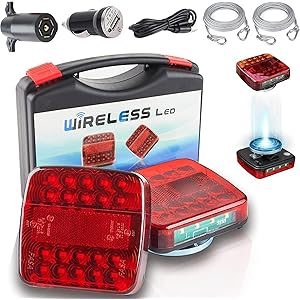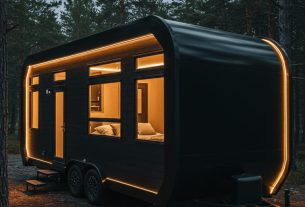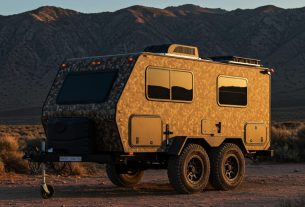When I first started exploring the housing market, I was overwhelmed by the variety of options available, especially when it came to mobile homes and traditional houses. As I delved deeper, I realized that the differences between these two types of dwellings are more pronounced than I initially thought. In this article, I’ll share my insights on the main distinctions between mobile homes and houses, helping you determine which option might be right for you.
Understanding Mobile Homes
Mobile homes, often referred to as manufactured homes, are prefabricated structures that are built in a factory and then transported to their intended location. These homes are usually placed on a permanent foundation or, in some cases, on wheels. Here’s what I discovered about mobile homes:
- Cost-Effective: One of the most significant advantages of mobile homes is their affordability. According to the U.S. Census Bureau, the average cost of a manufactured home is significantly lower than that of traditional homes, making them an attractive option for first-time buyers or those looking to downsize.
- Speed of Construction: Mobile homes can be built in a fraction of the time it takes to construct a traditional house. This quick turnaround can be particularly appealing for those who need to move in fast.
- Customization: Many manufacturers offer a range of customization options, allowing buyers to choose layouts, finishes, and features that suit their preferences.
- Mobility: True to their name, mobile homes can be moved, which offers flexibility if you need to relocate or change your living situation.
The Appeal of Traditional Houses
On the other hand, traditional houses are built on-site and typically have a more permanent structure. As I explored this option, the benefits became clear:
- Investment Potential: Traditional homes tend to appreciate in value over time, making them a more secure investment in the long run. Real estate experts often emphasize the importance of location and property value when considering home purchases.
- Financing Options: Traditional houses generally come with more financing options compared to mobile homes. Lenders are often more willing to provide loans for traditional homes, which can make the purchasing process smoother.
- Community and Resale Value: Living in a neighborhood with other traditional homes can create a sense of community, and these homes often have a higher resale value. This can be a significant factor if you plan to sell in the future.
- Building Codes and Regulations: Traditional homes must comply with local building codes and zoning regulations, which can ensure a certain quality of construction and safety.
Key Differences at a Glance
To help clarify the distinctions between mobile homes and traditional houses, I’ve put together a comparison table:
| Feature | Mobile Home | Traditional House |
|---|---|---|
| Cost | Generally lower | Higher |
| Construction Time | Faster | Longer |
| Customization | Available but limited | Highly customizable |
| Appreciation in Value | Less likely | More likely |
| Financing | Limited options | More options available |
Pros and Cons of Mobile Homes
Making an informed decision requires understanding the advantages and disadvantages of mobile homes. Here are some pros and cons I uncovered:
Pros
- Affordability: Lower costs make homeownership accessible.
- Quick Construction: Ideal for those needing immediate housing.
- Flexibility: Easier to relocate than traditional homes.
Cons
- Depreciation: Mobile homes tend to lose value over time.
- Financing Challenges: Fewer loan options can complicate purchasing.
- Limited Resale Value: Selling can be more difficult compared to traditional homes.
Pros and Cons of Traditional Houses
Just as important as evaluating mobile homes is understanding the pros and cons of traditional houses:
Pros
- Investment Stability: Higher potential for long-term appreciation.
- Financing Variety: More options for securing loans.
- Community Feel: Living among other traditional homes fosters a sense of belonging.
Cons
- Higher Costs: Initial investment is generally more substantial.
- Longer Construction Time: Building can take months or even years.
- Regulatory Hurdles: Must comply with local zoning and building codes.
What Works for You? Factors to Consider
So, how do I determine which option is right for me? Here are some factors I considered:
Budget
One of the first questions I asked myself was about my budget. Mobile homes are often the more economical choice. If you’re looking to minimize costs, a mobile home could be the right fit. However, if you have a larger budget and want to invest in property, a traditional house may offer better long-term value.
Location
Consider where you want to live. Some areas may have more mobile home parks, while others are primarily residential neighborhoods filled with traditional homes. The location will impact your decision significantly.
Investment Goals
Are you looking for a place to call home or an investment? If you’re focused on building equity and potentially reselling in the future, a traditional house might be the better option. On the other hand, if you’re seeking affordable living, a mobile home could suffice.
Lifestyle Preferences
My lifestyle preferences played a crucial role in my decision-making. If I value mobility and flexibility, a mobile home might be the way to go. Conversely, if I desire stability and community, investing in a traditional house might be more aligned with my goals.
Real-Life Examples and Case Studies
To illustrate the differences further, I found some compelling case studies:
Case Study 1: The Young Family
A young family with limited financial resources opted for a mobile home. They were able to purchase a three-bedroom unit for under $100,000 in a mobile home park. They loved the flexibility it offered while saving money for future investments. After five years, they decided to move into a traditional home as their family grew, allowing them to sell the mobile home at a fair price.
Case Study 2: The Retiree
A retiree decided to downsize and chose a traditional home in a 55+ community. Although the initial cost was higher, the appreciation in value over time and the sense of community provided a fulfilling lifestyle. The retiree was able to enjoy amenities and social activities, making the investment worthwhile.
Statistics That Matter
Here are some eye-opening statistics that further highlight the differences between mobile homes and traditional houses:
- According to the U.S. Census Bureau, around 20 million people live in mobile homes in the United States.
- The median sales price of new manufactured homes was approximately $118,000 in 2020, compared to over $350,000 for new single-family homes.
- Approximately 80% of mobile homes depreciate in value within the first five years.
Frequently Asked Questions (FAQ)
Are mobile homes a good investment?
Mobile homes can be a good investment for affordable living but typically do not appreciate in value like traditional homes. Consider your long-term goals before making a decision.
Can mobile homes be moved?
Yes, mobile homes are designed to be transported, but moving can be costly and complicated. It’s essential to consider the logistics before purchasing.
How do I finance a mobile home?
Financing options for mobile homes can be limited. You may need to seek out specialized lenders or consider personal loans. Always compare rates and terms carefully.
Conclusion
Choosing between a mobile home and a traditional house is a significant decision that requires careful consideration. Each option offers unique benefits and challenges, and understanding these can help you make an informed choice. Whether you prioritize cost, investment potential, or community, there’s a suitable option for everyone.
If you found this article helpful, please consider signing up for our newsletter for more insights and share it with your friends and on social media. Let’s continue the discussion about housing options—what are your thoughts on mobile homes versus traditional houses? I would love to hear your experiences!
Wireless Trailer Lights Magnetic, upgrade Rechargeable Wireless Trailer Tow Lights LED Kit, IP65 Waterproof, 10-Hour Battery Life, 100 FT Signal Synchronization for Towing Truck Camper RV Boat
$53.99 (as of November 15, 2025 07:52 GMT -03:00 - More infoProduct prices and availability are accurate as of the date/time indicated and are subject to change. Any price and availability information displayed on [relevant Amazon Site(s), as applicable] at the time of purchase will apply to the purchase of this product.)
Sign up for our newsletter and stay up to date with exclusive news
that can transform your routine!





